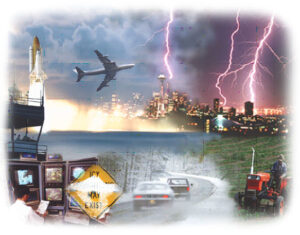 This article isn’t about surviving the impossible. Obviously, if an earthquake comes along and swallows your entire family and home while you’re sleeping, no amount of tangible preparedness will do you much good under those circumstances (although being able to tell your Creator that you at least heeded His warning while you were alive is bound to earn you some brownie points where it counts). Rather this article is about being better prepared for that time when you DO survive the impossible because sometimes surviving can feel like a punishment when you’re left with absolutely nothing. So, what can you do TODAY to ensure your well-being and safety later?
This article isn’t about surviving the impossible. Obviously, if an earthquake comes along and swallows your entire family and home while you’re sleeping, no amount of tangible preparedness will do you much good under those circumstances (although being able to tell your Creator that you at least heeded His warning while you were alive is bound to earn you some brownie points where it counts). Rather this article is about being better prepared for that time when you DO survive the impossible because sometimes surviving can feel like a punishment when you’re left with absolutely nothing. So, what can you do TODAY to ensure your well-being and safety later?
When a tornado comes and demolishes your years of accumulated essentials, it can no doubt make one feel that their efforts of preparedness are futile and not worth the time. I can only begin to fathom what such a scenario must feel like to a person who’s just 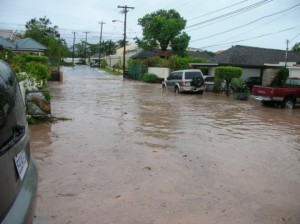 lost every tangible item they’ve ever owned in less than 5 minutes of an earthquake, tornado, hurricane, or tsunami. But believe it or not there are some strategies that you can still implement which can mitigate your losses and restore your life to a self-reliant state once again.
lost every tangible item they’ve ever owned in less than 5 minutes of an earthquake, tornado, hurricane, or tsunami. But believe it or not there are some strategies that you can still implement which can mitigate your losses and restore your life to a self-reliant state once again.
First of all, I would suggest that you not skimp on property insurance regardless of whether you’re renting or own your home. I say this with a full comprehension of all of the ways that insurance companies wrangle their way out of paying for your losses; but if it’s something that can restore order back in your life, then I suggest you take unusual measures to ensure that it will provide you with what you need in the event of a serious loss. Yes, insurance is a gamble unfortunately. And for the most part it’s an adversarial relationship from the get go. Though insurance can be identified as a gamble, to me its value is real and as such it’s no more of a gamble to me than spending money on extra essentials today. But if you take some defensive measures in the beginning, you’ll have an easier time getting what you need and deserve in a time of great trial.
Does your insurance cover a natural disaster?
For starters, be very clear on what your policy will and will not cover. Your concern needs to be on REPLACING that which you 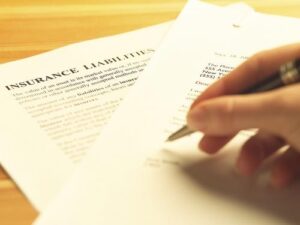 value. If an insurance policy doesn’t seem to cover all that you need, there’s a magic little thing known as riders. You can get a rider for almost anything. For example, suppose that your policy covers the replacement of household items up to $10,000, you can actually get a rider will cover specific items which you can designate such as a year’s supply of food, or the loss of your firearms and ammunition. You want to be sure that the essentials that are important to you now are covered in the event that they are destroyed in the future via theft or Mother Nature.
value. If an insurance policy doesn’t seem to cover all that you need, there’s a magic little thing known as riders. You can get a rider for almost anything. For example, suppose that your policy covers the replacement of household items up to $10,000, you can actually get a rider will cover specific items which you can designate such as a year’s supply of food, or the loss of your firearms and ammunition. You want to be sure that the essentials that are important to you now are covered in the event that they are destroyed in the future via theft or Mother Nature.
Next, take detailed photographs and video recordings of the belongings which you want replaced and/or covered. Store these photographs in a safe deposit box or at a neighbors or relatives home that would not likely be impacted by the same localized natural disaster.
Next,--and this isn’t likely to make any insurance sales folks too happy with me—but in the event that you do need to make a claim and the insurance company is giving you some hassles, one of the other things that I would suggest doing is recording your telephone conversations with your insurance broker or video tape them if they are meeting with you in your home. (Check with your state laws on the permissibility of this, but most laws state that so long as one of the participants knows that they are being recorded—which is YOU—then recording phone conversations are permissible.) The purpose of recording either the meetings or the phone conversations is so that you have a representative of the company on record as to what your policy covers. I don’t believe that 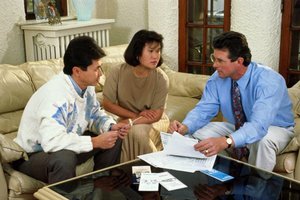 you’ll necessarily need to do this in a clandestine manner. You can simply inform that broker the purpose for making the recording—in order to avoid any confusion in the future. If the broker isn’t ok with making statements on film or audio recording, I’d be a bit suspect as to the veracity of their promises and claims. I also require that the broker show me where my policy states that certain items of concern to me are covered. Worst case scenario you have an audio or video recording that’s not permissible in court, but it sure will be permissible on YouTube and that may actually be a leveraging tool for you if you run into any problems getting your claim processed timely and accurately.
you’ll necessarily need to do this in a clandestine manner. You can simply inform that broker the purpose for making the recording—in order to avoid any confusion in the future. If the broker isn’t ok with making statements on film or audio recording, I’d be a bit suspect as to the veracity of their promises and claims. I also require that the broker show me where my policy states that certain items of concern to me are covered. Worst case scenario you have an audio or video recording that’s not permissible in court, but it sure will be permissible on YouTube and that may actually be a leveraging tool for you if you run into any problems getting your claim processed timely and accurately.
Now on to the next aspect of protecting yourself in the event of a serious natural disaster.
You know the saying don’t put all your eggs in one basket? Well, I go a little bit further and say don’t put all your baskets in the same place. Even if you don’t have a second location in which you can store vital documents, key essentials, etc. you should at the very least make sure that they are scattered all over your home. That way if a portion of your home is ruined, only a portion of your essential supplies will be compromised in the event of flooding or an earthquake. For example, as I’ve shared previously, I’ve got a lot of #10 cans of food and other provisions stored all over the house—behind furniture, books, under beds, in closets and 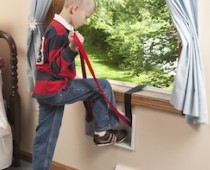 cupboards. Likewise, in the interest of self-defense, we have our tools of self-defense stored safely and accessibly all throughout the home as well. When you take this approach in your preparedness efforts, it’s also a good idea to have a written record of where you put some of these items. Have you ever lost something that you put in a special place so that it wouldn’t get lost and then couldn’t remember where that special place was? Yup, for exactly that reason having a map or general inventory list is a good idea. I also suggest you run the occasional drill with your family members or yourself in accessing these items quickly. Any time you can connect a physical action to a mental one it’s much more likely to be remembered. It doesn’t have to be this big, time consuming ordeal either. You’ll be surprised how much kids (and even yourself) will remember with just a few minutes of rehearsal.
cupboards. Likewise, in the interest of self-defense, we have our tools of self-defense stored safely and accessibly all throughout the home as well. When you take this approach in your preparedness efforts, it’s also a good idea to have a written record of where you put some of these items. Have you ever lost something that you put in a special place so that it wouldn’t get lost and then couldn’t remember where that special place was? Yup, for exactly that reason having a map or general inventory list is a good idea. I also suggest you run the occasional drill with your family members or yourself in accessing these items quickly. Any time you can connect a physical action to a mental one it’s much more likely to be remembered. It doesn’t have to be this big, time consuming ordeal either. You’ll be surprised how much kids (and even yourself) will remember with just a few minutes of rehearsal.
Next, as your storing your particular items throughout, constantly assess how they would fare under natural disaster circumstances. For example, I get a lot of my olive oil on sale in small bottles. I then wrap the small bottles up in newspaper (since I have so much from the coupons) and then place them in a four gallon square bucket with the lid firmly on so that if there’s an earthquake or 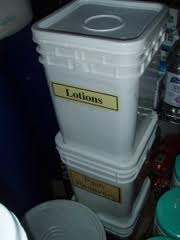 flooding, the contents of the bucket are not likely to get wet or broken. I also take such natural disasters into consideration when I’m putting items on my shelves. Glass items never go on the upper shelves in the event that they may fall. The shattered glass will only compound an already difficult situation. Instead, I put lighter items such as cereal boxes, or nuts, etc. on the higher shelves so that if they fall, they are not likely to break and cause other problems. Canned goods I put midway on the shelves and glass items, if not stored in buckets, I put on the bottom shelves. My husband has also secured the shelves to the backs of the walls and ceilings to provide an added measure of security. We also do some strategic planning in the event we are ever consigned to a particular room on our house. For example, let’s say we prepared for a looming tornado by going down into the basement in a particular room. If our way out of that room was blocked or unsafe after the disaster hit, would we have enough items in the room including tools to get us by until we could get out of there?
flooding, the contents of the bucket are not likely to get wet or broken. I also take such natural disasters into consideration when I’m putting items on my shelves. Glass items never go on the upper shelves in the event that they may fall. The shattered glass will only compound an already difficult situation. Instead, I put lighter items such as cereal boxes, or nuts, etc. on the higher shelves so that if they fall, they are not likely to break and cause other problems. Canned goods I put midway on the shelves and glass items, if not stored in buckets, I put on the bottom shelves. My husband has also secured the shelves to the backs of the walls and ceilings to provide an added measure of security. We also do some strategic planning in the event we are ever consigned to a particular room on our house. For example, let’s say we prepared for a looming tornado by going down into the basement in a particular room. If our way out of that room was blocked or unsafe after the disaster hit, would we have enough items in the room including tools to get us by until we could get out of there?
Lastly, but very important, don’t give up on getting your neighbors and community better prepared. The strength of having an entire community get on board with the need for self-reliance is invaluable. Look at the scenario during Hurricane Katrina. It took five days just to get water to the Super Dome. If the surrounding neighbors had been prepared just for their own family for a year, then the entire community would have been self-reliant, safe, and wouldn’t have had to subject themselves to the horrible crimes which came after the fact. Crimes occur because of desperation. Thus in a prepared community there is no fertile ground for crime to take root, even after a natural disaster. When the Teton Dam broke in Idaho neither the Red Cross or FEMA showed up for weeks and weeks. But no one starved to death because the prevailing religion of that area was LDS (aka Mormons) and as such there were plenty of homes and families which could benefit others who weren’t as fortunate. Remember, "We The People" are the first responders to any disaster. And if we set a good example for those around us in our own preparedness efforts AND share well-thought out, educated information with our neighbors, then we’re not just helping them endure tough times, we  could also be saving our own lives in the future.
could also be saving our own lives in the future.
Let me just share one other aspect of this neighborhood preparedness idea. Look at the aftermath of Japan as another example. You had individuals who truly experienced a life and death scenario as they endured first the earthquake and then the tsunami. Hundreds were in need of medical care and nourishment essentials. But the folks who weren’t badly impacted by either disaster, other than to have their light and water turned off for a few days, likewise taxed the emergency and charity services by being unprepared themselves. I cringed as I saw a scene play out on the television screen in the after math of the disaster of Japan. Here was a woman and her child who made it out alive with nothing but the clothes on their back, standing in line for water, rice, and some minor medical care. In that same line was a family of 6 (multiple generations) that were set back by nothing significant other than their own willful lack of planning. Their home and family was still intact. They were simply wanting for essentials. 18 bottles to your unprepared family could be 18 bottles of water for the truly displaced and discouraged. I realize that this may be a harsh way of saying this, but do you really want to be the reason why that mother and her baby are limited to the mere 4 bottles of water to live on either out in the open or in a cramped community building just because you weren’t willing to take responsibility for your own needs? An entire community that is prepared is a community that saves lives and is an asset amidst the aftermath of a disaster as opposed to a liability. So, don’t give up in sharing this wisdom with others. It’s a life or two you could be saving—and perhaps even your own.
Category:
© 2019 Of COURSE this post is Copyright Protected by Preparedness Pro. All Rights Reserved. NO portion of this article may be reposted, printed, copied, disbursed, etc. without first receiving written permission by the author. This content may be printed for personal use only. (Then again, laws are only as good as the people who keep them.) Preparedness Pro will pursue all violations of these rights just as vigorously as she does any of her other freedoms, liberties, and protections.
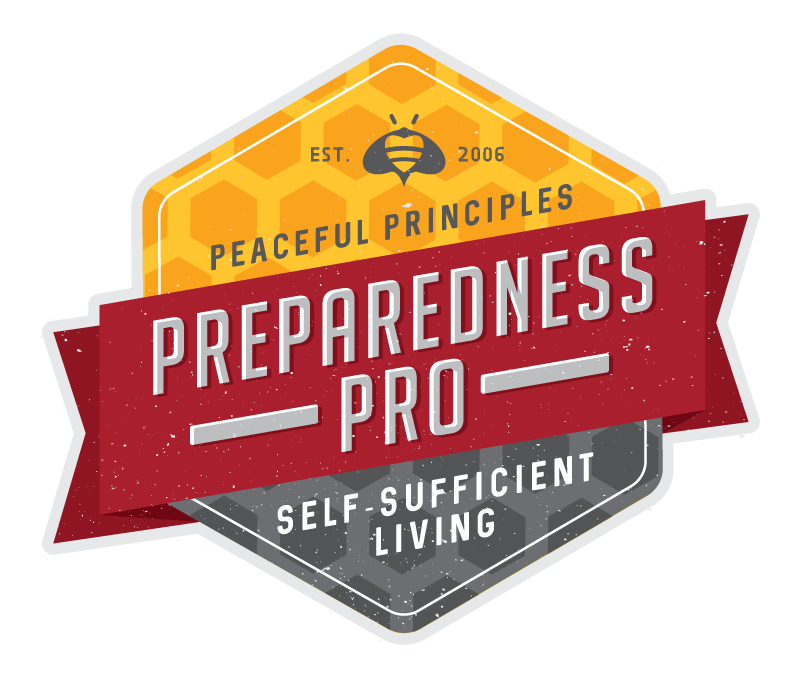


Comments
Self-Reliance takes self-discipline. Thanks Kellene!
Flooding should be a disaster everyone should think about as a possibility too! I was in a 100 yr flood 3.5 years ago, the levees broke and areas of the town were flooded that 'NEVER" flood. The next winter that same town was hit by a 500 year flood. The levees held this time. I lived in a different town same county and water came with in 15 feet of that house, but not IN that house. I was safe and had started again preparing for the Next time.
I felt more ready to face the storm. I had also completed ham radio licensing and could help with county emergency communications. I felt in control even though NO one can control water.
Preparedness helps!
Thank you for your blog,
CJ
Excellent info, Kellene! As always..you gave me much to think about
my parents had to evacuate from their home, then they had to evacuate again from the friend's house they went to because of the fires in Southern Arizona. They have learned that a 72 hour kit isn't enough. They have been out for a week already. And they don't know when they will get back. But they are one of the lucky ones because although the fire went through their neighborhood, their house did not burn. My mom said she has learned that you aren't safe anywhere and that you have to rely on God and trust him. That he is where your safety lies, not with your stuff.
Thanks for all of this info that will save alot of lives in the end!!
I am so glad I found your site! I am working my way through the archives, finding a wealth of information.
This is a bit off subject but I hope you can help me. I think I remember reading somewhere not to use colored garbage bags for water storage but that clear ones were ok because there were no chemicals used in making the clear ones. I have found 55 gallon clear 1.9 mill bags and wonder if I can use them for drinking water storage in a non food grade 55 gallon container. The box says "not recommended for food storage".
Thank you for all you do!
I think you've been exposed to one too many mythical tales. :-) No garbage bags are made for or water storage regardless of what their coloring is. Additionally, because they are intended for garbage, they would of necessity decompose at rapid pace. If you HAD to use a garbage bag under emergency circumstances to harvest dew or condensation I would, but that's about the extent of using garbage bag and water storage in the same sentence. :-)
Years ago I bought large food grade plastic bags with the plan that the bags could be put in a rigid container and then filled with water...the idea being you might only have containers available that you wouldn't want the water touching.
Yea, if they are made for that, that's great. But garbage bags would definitely not be made for that. Good idea though as a back up!
People have asked me about 'hoarding' as opposed to 'preparing.' My own thoughts: before the disaster it’s called ‘preparing’ and after the disaster it’s called 'hoarding' because hoarders are the ones stripping the store shelves of their contents. Those who ‘prepared’ or stored during times of plenty will not be stripping the store shelves nor standing in lines after the disaster.
~ Kandy
Another great artical Kellene. I am ashamed to admitt that I thought about my insurance, but have not done anything about it. I bought a nice digital camera (have not learned to use it in a year) I have my young tech guy coming up this weekend...He is also good with camera's, so I will start taking pictures to print out and save in safety deposit box. Then my insurance company and I will have a little talk. I had never thought about insuring my food supply, but why not! I have invested a lot of money there. As far as tools go there is a fully loaded gun in EVERY room of my house, plus ammo. No......I am not a gloom person, but I sure feel better knowing that I am well protected....Now that it is nice weather I have been going target practicing with an ex police officer......I have really improved...lol Now....last Christmas I bought way too many chocolates, I hid them from myself......If amyone has any idea where I may have put them.....PLEASE email me!
I had never thought about insuring food storage either. What a great idea. Thanks so much, Kellene!
As always you are on top of stuff. Mom and I are trading photos of stuff at home for insurance. While we are in the same general area it does give us some protection against house fires and home disasters.
I've also moved some storage of water food and stuff to the RV, into closests and the shop. It gives me more options. Thanks a lot.
Gonna work on dividing up my storage to have some on every floor!
Great post! Insurance is something I need to think more about. Thanks for the reminder.
Could not have stated this better myself!! Thank you for all you do for peaceful prepredness around our world! May I quote you from this article with appropriate acknowledgement?
yes you may. Send me a bit of what you do afterwards, ok? Thanks.
Thanks Kellene for sharing this, I just shared it with everyone on my facebook page. A lot of people think that I am crazy when I tell them that I am a prepper for natural disasters that occur in our area, now they can see the facts that you shared.